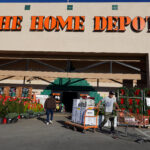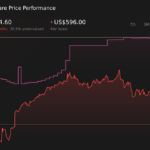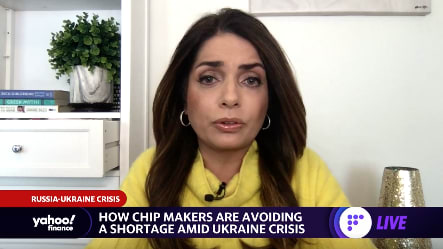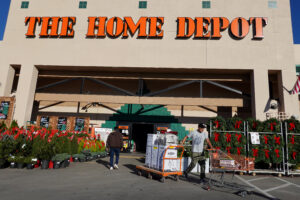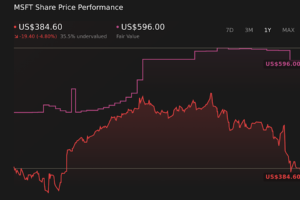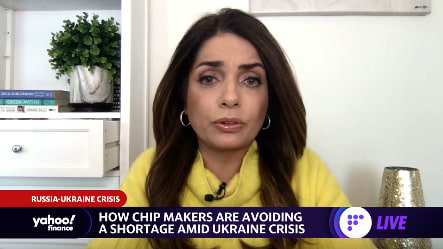
Yahoo Finance’s Karina Mitchell discusses how chip makers are navigating supply challenges amid the Russia-Ukraine war.
Video Transcript
– Now, we want to switch gears here and we’re going to talk about US companies who are steeling themselves for further supply disruptions tied to the war in Ukraine. But there is an unexpected upside for the chip industry after almost two years of severe shortages tied to the global pandemic. Yahoo Finance’s Karina Mitchell has more. Karina?
KARINA MITCHELL: Hey, Jared. Yeah, that’s absolutely right. So having had to deal with two years of turmoil tied to the pandemic, they’ve had to do a lot of navigating the chip industry. So it’s actually in a position where it’s better able to deal with the chaos right now that’s going on in the war in Ukraine. And you might ask, why?
Because a lot of the raw materials that go into chip making actually come from Russia and Ukraine– two in particular. So neon and palladium. So according to industry analysts, about half of the world’s semiconductor grade neon comes from both of those countries. And Russia produces about a third of the world’s palladium. So you can see that if a shortage happens, it would squeeze an industry that’s already dealing with red hot demand.
However, that may be a scenario that doesn’t actually happen, at least not in the near term. And that’s because the industry has really had to recalibrate itself, right, after being bludgeoned by the pandemic. But it’s not just COVID that’s hammered this industry, as you guys know very well. You know, it’s also not geopolitical tension. It’s also climate that’s played a big part in hammering, you know, chip production as well.
So take for example, Taiwan, a big producer of chips– been dealing with an ongoing drought, right? And so a lot of water is required to help make these chips. Also dealing with a freeze in Texas, guys, and also a lot of fires at chip plants that are going on. So they’ve had to navigate a lot of things over the last– dodging a lot of bullets, if you will, over the last 24 months.
– Karina?
KARINA MITCHELL: Guys?
– What are these companies trying to do to protect their production?
KARINA MITCHELL: Yes, a great question, Brian. What they need to do is actually supply chain, right? Shore up their supply chain. And that’s what they’ve been doing. So reaching out to alternate sources to make sure that they have enough under their belts so they have options available. They’ve also been stockpiling key materials like neon and other raw materials that are needed.
So according to a report in “The Wall Street Journal,” a lot of these suppliers are actually in a good position, saying that they have anywhere from six weeks to three months of key supplies that they need. So actually, well-positioned. And in fact, Taiwan Semiconductor Manufacturing, that’s the world’s largest contract chipmaker, they started looking for alternate sources of neon even before the invasion happened. So as soon as they saw troops amassing on the Ukraine border, they went out to look for these alternate sources so they wouldn’t be caught flat-footed.
And they actually say that right now they’re in a good position. They have enough supplies, so they’re not too worried about it. So that’s great news. And then there’s another company, Infineon Technologies, is a large German chipmaker that does a lot of supplying to the auto industry. You guys know very well how hard hammered, how hard hit the auto industry has been by a lack of chip supply.
Ford is the latest in fact, who just said that they’re going to start shipping some of their vehicles without the chips that control air conditioning and heating. So, so much backlog that they’re dealing with there. But this company says that it, too, has options for suppliers. So they’re not too worried.
You have to remember that these chip companies actually learnt a lesson back in 2014. This isn’t the first time they’ve been exposed to this kind of problem. Because when Russia annexed Crimea back then, neon prices spiked. So they had to scurry and look for alternate sources. So this isn’t something that’s completely new to them. Also, the White House has been in touch with them and warned all of these chipmakers that if an invasion happened, export controls would go into place, along with other actions as well. And you know, as you know, the Biden administration has been in constant touch with these chipmakers particularly over the last year as they try and drum up inventory for our own domestic use as well, guys.
So a lot of maneuvering happening behind the scenes.
– Yeah, and Karina I’m glad you brought up that Ford story– shipping and selling their Explorer SUVs with those missing chips– because we’re going to talk about that with Pras Subramanian in a little bit. But I want to ask you one more question here, with all the sanctions that have gone on with respect to Russia not only by the US and the world, can you just kind of bring us up to speed on where we are with these chip sanctions?
KARINA MITCHELL: Yeah, sure. So the US banning chips and some technology to strategic industries in Russia, but not all Russian business. So there are some chips that actually can make it into Russia. At the moment, they haven’t been banned. But of course, you know there’s all of this self-sanctioning that’s been going on. So companies like Intel, Nvidia, AMD, none of them are sending chips to Russia right now.
So bottom line is that these chipmakers are pretty well-positioned as far as supply. They don’t export a lot to Russia when it comes to chips. So they’re buffered there. So for right now they’re in a pretty good position, but as this war goes on, if it gets protracted, if it goes on longer, things could change. And we have learned over the last two years how important chips are. They;re in everything, guys.
– They are in everything. And change is happening pretty quickly all around us. Thank you for that report. Yahoo Finance’s Karina Mitchell.

